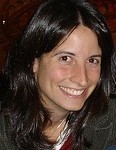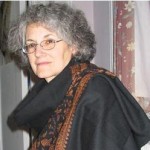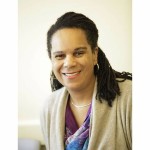Faculty members from across the campus participate in the WAC Program. They include:
Llana Barber, American Studies
Llana Barber is an Assistant Professor in the American Studies department. She joined the Old Westbury community in September 2011 and mainly teaches courses in immigration and urban history. Her research focuses on the transition of Lawrence, Massachusetts to a Latino-majority city in the late 20th century.
Prof. Barber is thrilled to be teaching writing-intensive courses, as she believes that frequent writing encourages students to engage with the course material and to concretize their knowledge. Her courses are designed to help students articulate their own views on the past, but also to support those views with evidence.
Catherine Bernard, Visual Arts
Dr. Catherine Bernard has taught at Old Westbury for 12 years. She teaches art history in the Visual Arts Department. Her room number is F103 and her email address : bernardc@oldwestbury.edu.
Teaching Writing Intensive courses is a great opportunity for her to develop an appreciation for writing and critical thinking among her students. She hopes to foster and sustain an interest for writing about art and develop the necessary skills to do so. Her personal interests reside in contemporary arts and cultures from around the world, including African art.
Sanja Cale, School of Education
Dr. Sanja Cale is an Assistant Professor in the School of Education. She is currently the director of the NYS Regional Center for Autism Spectrum Disorders at Old Westbury, where she provides intervention strategies to children with developmental disabilities, support services to their families, and training and supervision to professional staff in public school settings throughout Long Island. She has been teaching at Old Westbury since 2009, and her teaching focus includes empirically supported interventions for individuals with disabilities, applied behavior analysis, and inclusive practices in the classroom. Similarly, her research focuses on expanding FBA (Functional Behavioral Assessment) and PBS (Positive Behavior Support), which are approaches that provide prosocial alternatives to dealing with challenging behaviors in individuals with disabilities. She hopes that with the addition of the writing intensive component to her coursework, students will be able to use writing as an opportunity to pause and think about their own approaches to students with differing abilities in the classroom.
Veronika Dolar, Politics, Economics, and Law
![]() Dr. Dolar has a very rich international experience. She was born in Slovenia (at that time still under Yugoslavia), obtained her international baccalaureate (IB diploma) in Italy at the United World College of the Adriatic and graduated summa cum laude from the University of Western Ontario in Canada. Dr. Dolar also worked at the Bank of Canada and taught at numerous universities and colleges including Case Western Reserve University in Cleveland, OH and St. Olaf College in Minnesota.
Dr. Dolar has a very rich international experience. She was born in Slovenia (at that time still under Yugoslavia), obtained her international baccalaureate (IB diploma) in Italy at the United World College of the Adriatic and graduated summa cum laude from the University of Western Ontario in Canada. Dr. Dolar also worked at the Bank of Canada and taught at numerous universities and colleges including Case Western Reserve University in Cleveland, OH and St. Olaf College in Minnesota.
Her current research interests include health economics focusing on eating decision, nutrition and obesity, labor economics, as well as economic education.
Dr. Dolar joined the department of Politics, Economics, and Law here at Old Westbury in the fall of 2017 where she is teaching Introductory Micro- and Macro-economics, Health Economics, and a new course in Food and Wine Economics.
She is a believer in constructionist pedagogy and believes that we learn best when we are actively engated in constructing something that has personal meaning to us. She is hoping to engage her students in writing by co-authoring open educational resource (OER) textbooks.
http://veronikadolar.weebly.com
Jacqueline Emery, English, & Coordinator of the Writing Across the Curriculum Program
 Dr. Jacqueline Emery joined the Old Westbury faculty as an Assistant Professor of English in 2012. Her book, Recovering Native American Writings in the Boarding School Press (U Nebraska P, 2017), won the 2018 Popular Cultural Association Ray & Pat Browne Award for Best Edited Collection in Popular Culture and American Culture. Professor Emery teaches undergraduate courses in women’s literature and multiethnic US literature as well as Senior Seminar I and II. In all of her classes, she takes a process-oriented approach to teaching writing. She enjoys teaching students how to become stronger, more confident writers and working with faculty to foster a commitment to writing at SUNY Old Westbury.
Dr. Jacqueline Emery joined the Old Westbury faculty as an Assistant Professor of English in 2012. Her book, Recovering Native American Writings in the Boarding School Press (U Nebraska P, 2017), won the 2018 Popular Cultural Association Ray & Pat Browne Award for Best Edited Collection in Popular Culture and American Culture. Professor Emery teaches undergraduate courses in women’s literature and multiethnic US literature as well as Senior Seminar I and II. In all of her classes, she takes a process-oriented approach to teaching writing. She enjoys teaching students how to become stronger, more confident writers and working with faculty to foster a commitment to writing at SUNY Old Westbury.
John Friedman, American Studies
John S. Friedman is an associate professor of media and communications. He has taught a variety of writing courses from Writing for Media to Feature Writing, and he has been the faculty advisor to The Catalyst newspaper for seven years.
He received his Ph.D. in comparative literature from NYU in 1974 and he has had a career in journalism as a reporter, war correspondent, and magazine editor. He has edited and written three books — First Harvest: The Institute for Policy Studies, 1963-1983 (Grove Press); The Secret Histories: Hidden Truths That Challenged the Past and Changed the World (Picador); and Out of the Blue: A History of Lightning: Science, Superstition and Amazing Stories of Survival (Delacorte). His articles have appeared in a number of publications, including the New York Times, Commentary, and Mother Jones and he is a longtime contributor to The Nation.
Amanda Frisken, American Studies
Amanda Frisken is an Associate Professor and Chair of American Studies at the State University of New York, College at Old Westbury, where she teaches a broad range of courses in American history, society and culture. She received her PhD from the History Department at SUNY Stony Brook in 1999. Her book, Victoria Woodhull’s Sexual Revolution: Political Theater and the Popular Press in Nineteenth Century America, based on her doctoral dissertation at Stony Brook, was published by the University of Pennsylvania Press in 2004. Currently, she is at work on a new book project, tentatively titled Sensationalism and Modern Culture. The book concerns controversies surrounding the rise of commercial media in American culture, with a particular focus on men’s illustrated sporting newspapers like the National Police Gazette, from the Civil War to the turn-of-the-century. An article, entitled “‘A Song Without Words:’ Lynching Imagery in the 1890s African-American Press,” based on a chapter of that book, was recently published in the Journal of African American History.
Marcia Ann Gillespie, American Studies
A former magazine editor and a noted author, Marcia Gillespie is a visiting professor at Old Westbury teaching Media and Communications. As a result of her background in publishing and extensive experience working with writers the courses she teaches are aimed to provide students with a practical understanding of the requirements for working in the field and a solid grounding in essential components of writing for the media. She has been teaching at the college since 2010 and in the class room has focused on developing and bolstering students’ skills as critical thinkers, thoughtful and informed writers, in addition to honing basic writing techniques and skills.
Although her courses have always been writing intensive she hopes that this program will improve her work and further encourage and support her students to become ever better writers and thinkers and communicators.
William Gillis, Biology
An adult xenopus laevis frog. We truly live in an amazing time in biology. When I was still in my undergraduate studies, the first human genome sequence was released. What we found was a little startling, as our genomes are remarkably similar to very distantly related invertebrates such as flies or worms. This means at some point, both flies and humans shared an ancestor with a fairly sophisticated set of body patterning genes, with our differences in bodies largely the result of reuse and redeployment of these genes.
In vitro fertilization of a mass of xenopus laevis embryos. I’ve spent my career exploring many of the questions that this remarkable conservation brings up. This work has had me study how similar genes are used to pattern a diversity of animals, from marine worms, sea anemones, lancelets, and now to frog and mammalian cells systems. As a new assistant professor at SUNY Old Westbury, I use frog embryos and mammalian cell culture to better understand key signaling pathways which normally control development and whose misregulation lead to diseases such as cancer. Before coming to Old Westbury, I was a NY-CAPS postdoctoral fellow at Stony Brook University, an NIH-IRACDA program designed to train the next generation of researchers and teachers. For more info, see this video I made as a postdoctoral fellow: https://www.youtube.com/watch?v=q5dqcgFnkOI
Jacob Heller, Sociology
 Jacob Heller is an associate professor in the Sociology Department. His teaching philosophy requires students to take an active role in their learning, and his courses emphasize mastery of material, critical thinking and clear writing. In 2012 he received a Faculty Appreciation Award for Teaching,from the Division of Student Affairs and the Excellence in Education Faculty Award from the Alumni Association.
Jacob Heller is an associate professor in the Sociology Department. His teaching philosophy requires students to take an active role in their learning, and his courses emphasize mastery of material, critical thinking and clear writing. In 2012 he received a Faculty Appreciation Award for Teaching,from the Division of Student Affairs and the Excellence in Education Faculty Award from the Alumni Association.
His research areas are historical sociology, the sociology of science and medicine and the theories that underlie methodology. His 2008 book, The Vaccine Narrative, looked at how cultural narratives can “trump” ethical rules, scientific findings and common sense. He is currently working on a book project analyzing how “narratives of distrust” mediate the relationship between African Americans and health/research institutions in the United States, in the context of public health efforts to stem the HIV-AIDS. He is also interested in using literature to teach sociology (and the sociology of literature).
Diane Hopkins, School of Education
Diane Hopkins is an Adjunct Professor in the School of Education. She has been teaching at SUNY Old Westbury since 2011. Ms. Hopkins’ experience as a teacher, dean, assistant principal, principal, new teacher/mentor coordinator and educational evaluator in several school systems serves her well as she prepares teacher candidates for their future roles in the educational field. She is well aware that today’s twenty-first century students need to compete in a global economy as effective communicators and thus must be proficient in their ability to express themselves both verbally through higher-level thinking and in writing in an articulate fashion. Ms. Hopkins is delighted that she has been afforded the opportunity to participate in the Writing across the Curriculum Pilot Program, a venue that not only promotes the development of students’ writing skills but encourages an appreciation for quality of content through active engagement.
Amy Hsu, School of Education
 Amy Hsu has been a member of the Childhood Education and Literacy department at SUNY Old Westbury since 2006, teaching primarily graduate courses in the adolescent education MAT and MS programs. She is a teacher educator, with a strong research interest in literacy and language learning, standardized testing, teacher accountability, professional development, and student-centered learning.
Amy Hsu has been a member of the Childhood Education and Literacy department at SUNY Old Westbury since 2006, teaching primarily graduate courses in the adolescent education MAT and MS programs. She is a teacher educator, with a strong research interest in literacy and language learning, standardized testing, teacher accountability, professional development, and student-centered learning.
Before becoming a college professor, Dr. Hsu worked as an eighth grade English teacher in the public school system on Long Island. She is excited to begin using a writing intensive approach with the undergraduate teacher candidates in the semester before they student teach so that they can further develop the writing skills they will be responsible for teaching their own students.
Svetlana Jović joined SUNY Old Westbury in 2018 as an Assistant Professor of developmental psychology. She is a sociocultural psychologist with expertise in diverse methods of critical sociocultural analysis, including narrative, sociolinguistic, visual, and spatial analysis. Dr. Jović studies the effects inequality has on development from the perspective of human potential and resilience, rather than a deficit-oriented perspective. Through acknowledging the detrimental effects of the socioeconomic (and political) challenges that many adolescents–especially the underrepresented–experience, Dr. Jovićs work emphasizes the socio-cognitive advantages that young people growing up in adversity acquire. She employs narrative and discourse as research tools for studying the relationship between sociocultural context and individuals.
Language occupies a central role both in her research and in her classroom. Dr. Jović regards writing as a powerful tool that promotes learning and critical thinking. She sees thoughtful writing assignment construction, scaffolding, and feedback playing a crucial role in achieving the goals of helping students acquire the necessary skills to master discipline-specific ways of thinking. To that end, Dr. Jović engages students in writing assignments that help them become more proficient in various problem-solving and writing formats in which psychologists may engage.
Thomas J. Lilly, Jr., Politics, Economics, and Law
 Thomas J. Lilly, Jr. received his BA from Holy Cross College and JD from Georgetown University, where he was Executive Editor of the Georgetown Law Journal. After law school he clerked for the Hon. F.X. Altimari on the United States District Court for the Eastern District of New York and on the Second Circuit Court of Appeals. He practiced law for twenty years before joining Old Westbury as Assistant Professor and Coordinator of the Industrial and Labor Relations Program. He is a past president of the Long Island Labor and Employment Relations Association, a trustee of the Stephen K. Tompsett Memorial Fund for Technology in Education, a member of the American Arbitration Association Labor Arbitration Panel, a frequent presenter at Continuing Legal Education programs and an occasional contributor to the editorial pages of Newsday. He teaches writing not only as a communication skill, but also as a way for students to learn to structure their reasoning process.
Thomas J. Lilly, Jr. received his BA from Holy Cross College and JD from Georgetown University, where he was Executive Editor of the Georgetown Law Journal. After law school he clerked for the Hon. F.X. Altimari on the United States District Court for the Eastern District of New York and on the Second Circuit Court of Appeals. He practiced law for twenty years before joining Old Westbury as Assistant Professor and Coordinator of the Industrial and Labor Relations Program. He is a past president of the Long Island Labor and Employment Relations Association, a trustee of the Stephen K. Tompsett Memorial Fund for Technology in Education, a member of the American Arbitration Association Labor Arbitration Panel, a frequent presenter at Continuing Legal Education programs and an occasional contributor to the editorial pages of Newsday. He teaches writing not only as a communication skill, but also as a way for students to learn to structure their reasoning process.
Runi Mukherji, Psychology
 Dr. Runi Mukherji is a Cognitive/Experimental psychologist by training. Her professional interests are in the area of cross-cultural issues in illness and wellness. She has been a proud member of the Old Westbury faculty for over 30 years, and she currently serves as Chair of the Psychology Department.
Dr. Runi Mukherji is a Cognitive/Experimental psychologist by training. Her professional interests are in the area of cross-cultural issues in illness and wellness. She has been a proud member of the Old Westbury faculty for over 30 years, and she currently serves as Chair of the Psychology Department.
Lynnda M. Nadien, School of Education
 Dr. Lynnda M. Nadien serves as an Adjunct Professor in the School of Education at SUNY Old Westbury. She is currently teaching her first course this semester and is thrilled to have been afforded the opportunity to serve the college in this capacity. Her interests include reading, music, and writing. As a ‘WAC’ instructor, she believes that writing is an art form, and can become a valuable aspect of all learning, even for the most reluctant writer. Dr. Nadien supports this notion by allowing her students to keep reflective journals, and respond to selected prompts based on what has been learned. Additionally, she has allowed her students to discuss and write about what interests them to allow them to gain insight about their views of themselves as writers. Dr. Nadien believes in the philosophy of ‘education as the key’ to success and takes pride in her quest to engage all students in the process of teaching and learning.
Dr. Lynnda M. Nadien serves as an Adjunct Professor in the School of Education at SUNY Old Westbury. She is currently teaching her first course this semester and is thrilled to have been afforded the opportunity to serve the college in this capacity. Her interests include reading, music, and writing. As a ‘WAC’ instructor, she believes that writing is an art form, and can become a valuable aspect of all learning, even for the most reluctant writer. Dr. Nadien supports this notion by allowing her students to keep reflective journals, and respond to selected prompts based on what has been learned. Additionally, she has allowed her students to discuss and write about what interests them to allow them to gain insight about their views of themselves as writers. Dr. Nadien believes in the philosophy of ‘education as the key’ to success and takes pride in her quest to engage all students in the process of teaching and learning.
Barbara Olsen, School of Business
 Dr. Barbara Olsen has taught marketing courses in Business since1989 after leaving a twenty-year career in advertising and believes that marketing is a communication skill. She integrates her interest (and Ph.D) in cultural anthropology with research and writing on advertising and consumer behavior. She believes that marketing students need to understand dynamics of the marketing system not only to know how to apply the concepts, but also to become perceptive of their own role in our consumer culture. Thus, she requires weekly critiques of articles, videos and introspective journal writing. In all classes, she enforces a strong writing component, but especially in her WAC classes where a heavier emphasis is on the quality of content. (Her office is in NAB Room 0065 and can be reached at olsenb@oldwestbury.edu)
Dr. Barbara Olsen has taught marketing courses in Business since1989 after leaving a twenty-year career in advertising and believes that marketing is a communication skill. She integrates her interest (and Ph.D) in cultural anthropology with research and writing on advertising and consumer behavior. She believes that marketing students need to understand dynamics of the marketing system not only to know how to apply the concepts, but also to become perceptive of their own role in our consumer culture. Thus, she requires weekly critiques of articles, videos and introspective journal writing. In all classes, she enforces a strong writing component, but especially in her WAC classes where a heavier emphasis is on the quality of content. (Her office is in NAB Room 0065 and can be reached at olsenb@oldwestbury.edu)
Kevin Ozgercin, Politics, Economics, and Law
Dr. Kevin Ozgercin is Assistant Professor in the Department of Politics, Economics, and Law. He began teaching at Old Westbury in 2007 after earning his Ph.D. in Political Science from The Graduate Center of the City University of New York. He is the recipient of several awards, and is twice the recipient of the prestigious Fulbright Scholarship. Dr. Ozgercin is broadly trained in the academic disciplines of International Relations and Comparative Politics. Within these disciplines, Dr. Ozgercin specializes in the study of International Political Economy, International Organizations, and Middle Eastern Politics. He sees writing in general and in-class writing in particular as indispensable methods of enhancing student learning and achieving learning goals in each of his classes.
Lillian Park, Psychology
 Strunk & White Version: Dr. Lillian Park was born and raised in California. Then she froze in Canada. Now she is thriving in New York.
Strunk & White Version: Dr. Lillian Park was born and raised in California. Then she froze in Canada. Now she is thriving in New York.
Marcel Proust Version: For a long time I used to wonder, “How did I get here?” Sometimes, when I arrive, time would pass so quickly that it was time to go back home again. But where is home? I was born in Los Angeles, amid a chaotic and cacophonic neighborhood where street smarts bought you more cred than book smarts. As a child I pondered the questions of life, such as, “What is truth? Is truth universal? Or is it relative?” Then one day my parents thrust me into the disquieting calm of suburbia, where book smarts mattered more than street smarts. I traveled north to the Republic of Berzerkeley, where after four years, I graduated with a degree in Psychology. Frightened of the imagined horrors and terrors of the real world and working, I quickly turned around and fled for the safety of the ivory tower. There I buried myself in a quest to solve the mystery that had haunted me for so long – What is truth? – by investigating the cognitive causes of false memory. That noble quest eventually devolved into a struggle against the great three-headed committee who wanted me “to make one more revision.” I fended them off and wandered lost into the Great White North. While in Toronto, I slaved to find knowledge of the neural substrates that were involved in memory processes. After one too many blizzards, I decided that being warmer was more important. I came to the bright lights and constant buzz of New York City, where I discovered many culinary delights and feasts for gourmands. I too dip a madeleine in my tea.
Carol Quirke, American Studies
 Professor Carol Quirke was twenty before she understood words bring joy. Nothing in years of voracious reading: cereal boxes over breakfast, or romances hidden from her teachers’ view, prepared her for Virginia Woolf’s A Room of One’s Own. Woolf seduced, wending her way to an argument belonging in a political tract. She explored social inequality by lingering over brussels sprouts “foliated as rosebuds,” meandering through English schoolyards, and arguing with her friend’s dead mother. It took Professor Quirke another two decades to learn writing’s pleasures. She had published arts criticism, edited newsletters, penned grant proposals, and memos and leaflets. She had taught ESL in Andean capitals and in the crumbling spaces of urban public housing. At Hunter College she had graded students’ writing. Yet writings’ rudiments eluded.
Professor Carol Quirke was twenty before she understood words bring joy. Nothing in years of voracious reading: cereal boxes over breakfast, or romances hidden from her teachers’ view, prepared her for Virginia Woolf’s A Room of One’s Own. Woolf seduced, wending her way to an argument belonging in a political tract. She explored social inequality by lingering over brussels sprouts “foliated as rosebuds,” meandering through English schoolyards, and arguing with her friend’s dead mother. It took Professor Quirke another two decades to learn writing’s pleasures. She had published arts criticism, edited newsletters, penned grant proposals, and memos and leaflets. She had taught ESL in Andean capitals and in the crumbling spaces of urban public housing. At Hunter College she had graded students’ writing. Yet writings’ rudiments eluded.
“Thought—to call it by a prouder name than it deserved—had let its line down into the stream. It swayed, minute after minute, hither and thither among the reflections and the weeds, letting the water lift it and sink it, until- you know the little tug- the sudden conglomeration of an idea at the end of one’s line: and then the cautious hauling of it in, and the careful laying of it out.” Woolf’s dreamy description of setting her ideas down on paper held within it an argument about how social structures shape writing. Woolf believed women lacked the time, space, and resources to engage in writing’s labors.
Writing often appears a talent that we have—or don’t. We lack Woolf’s knowledge that writing is playful experimentation requiring time and space. Professor Quirke looks forward to engaging with students to develop an understanding of writing as paths taken and forsaken, failures and serendipitous finds, “an idea at the end of one’s line” that only comes with caring attention.
Stephanie Schneider, School of Education
Dr. Stephanie Schneider is an Assistant Professor of Childhood Education. She joined the Old Westbury community in 2012. She mainly teaches courses on literacy and interdisciplinary methods of education. Her research focuses on how language use influences pedagogy. Dr. Schneider is excited to be teaching in the Writing Across the Curriculum program. She believes that writing will help teacher candidates to reflect on their work, examine their own language use, and provide opportunity to develop their own voice in the classroom.
Basilio Serrano, School of Education
![BasilioSerranoPic2012[1]](http://oldwestburywac.com/wp-content/uploads/2012/10/BasilioSerranoPic201212-300x224.jpg) Basilio Serrano is a professor in the School of Education. Prior to teaching at Old Westbury, Serrano was on the full-time faculty of Brooklyn College. He is also a former elementary school teacher and has taught in Harlem, East Harlem and the Bronx. As an adjunct instructor, Dr. Serrano has also taught in various colleges in the New York area. He specializes in preparing teachers to work with children who are immigrants and English language learners.
Basilio Serrano is a professor in the School of Education. Prior to teaching at Old Westbury, Serrano was on the full-time faculty of Brooklyn College. He is also a former elementary school teacher and has taught in Harlem, East Harlem and the Bronx. As an adjunct instructor, Dr. Serrano has also taught in various colleges in the New York area. He specializes in preparing teachers to work with children who are immigrants and English language learners.
Elena Smirnova, School of Business
 Elena Smirnova completed her Ph.D. in Business from the Graduate Center, CUNY. She earned her M.A. in Economics from the University of Connecticut. Her research interests include Global Financial Markets, Emerging Equity Markets and Corporate Finance. Prior to joining State University of New York at Old Westbury, she worked at Molloy College in Rockville Centre and in Baruch College in New York City. Dr. Smirnova is an active member of the Eastern Finance Association and Eastern Economic Association. She contributes to the American Investment Services Investment Guide on the use of commodities in portfolio diversification. Her writing intensive Financial Management course will improve the comprehension of both quantitative and conceptual aspects of finance by the business majors.
Elena Smirnova completed her Ph.D. in Business from the Graduate Center, CUNY. She earned her M.A. in Economics from the University of Connecticut. Her research interests include Global Financial Markets, Emerging Equity Markets and Corporate Finance. Prior to joining State University of New York at Old Westbury, she worked at Molloy College in Rockville Centre and in Baruch College in New York City. Dr. Smirnova is an active member of the Eastern Finance Association and Eastern Economic Association. She contributes to the American Investment Services Investment Guide on the use of commodities in portfolio diversification. Her writing intensive Financial Management course will improve the comprehension of both quantitative and conceptual aspects of finance by the business majors.
Samara Smith, American Studies–Media and Communications
 Samara Smith, an Assistant Professor in the American Studies department, teaches media studies and production with a focus on documentary video and new media. Believing students learn best when they are actively engaged, Smith often uses short informal writing activities to encourage student engagement with course materials. Smith also encourages revision, seeing writing, and all creative activity, as an iterative process, improved by feedback and reflection. Before coming to Old Westbury in 2008, she worked for over a decade in documentary film. Her current creative work focuses on site-specific mobile media documentaries in, and about, public space.
Samara Smith, an Assistant Professor in the American Studies department, teaches media studies and production with a focus on documentary video and new media. Believing students learn best when they are actively engaged, Smith often uses short informal writing activities to encourage student engagement with course materials. Smith also encourages revision, seeing writing, and all creative activity, as an iterative process, improved by feedback and reflection. Before coming to Old Westbury in 2008, she worked for over a decade in documentary film. Her current creative work focuses on site-specific mobile media documentaries in, and about, public space.
Margaret Rose Torrell, English
 A member of the English Department at SUNY College at Old Westbury since 1994, Dr. Torrell has witnessed firsthand the potential of writing intensive courses to develop and sharpen her students’ writing and thinking ability. As the founder of the Writing across the Curriculum Pilot Program, Dr. Torrell enjoys working with talented faculty members on integrating writing and writing pedagogy into their courses. She teaches courses in advanced writing, writing theory, disability studies, women’s literature, and English literature. Her recent publications include essays on critical pedagogy, the disability community in Simi Linton’s My Body Politic, and disabled masculinity in such wide ranging texts as the autobiographies of Nancy Mairs and Charlotte Bronte’s Jane Eyre.
A member of the English Department at SUNY College at Old Westbury since 1994, Dr. Torrell has witnessed firsthand the potential of writing intensive courses to develop and sharpen her students’ writing and thinking ability. As the founder of the Writing across the Curriculum Pilot Program, Dr. Torrell enjoys working with talented faculty members on integrating writing and writing pedagogy into their courses. She teaches courses in advanced writing, writing theory, disability studies, women’s literature, and English literature. Her recent publications include essays on critical pedagogy, the disability community in Simi Linton’s My Body Politic, and disabled masculinity in such wide ranging texts as the autobiographies of Nancy Mairs and Charlotte Bronte’s Jane Eyre.
S. Touma, MATH/CIS Department
Professor Touma has a passion for effective writing, particularly technical communication. By empowering her students with targeted, personalized and specific adjustments, she inspires them to markedly improve their writing. She draws on both her award-winning writing and her industry experience. Her nuanced sensitivity to writing is rooted in her knowledge of Latin and in her enthusiasm for grammar. Notably, writing is a “threshold skill” for hiring and promotion and is essential in daily tasks of e-mail, powerpoint, company reports, memos, etc… (Markel, 2012). Professor Touma is especially delighted about the collaborative and interdisciplinary nature of the WAC program.
Judith Walsh, History and Philosophy
 Dr. Judith Walsh has taught courses on India, China, and Japan in the History and Philosophy Department of Old Westbury since 1982. Her courses have ranged from an introductory course on World History to a Masters level course on the history of India. Dr. Walsh has a Ph.D. in South Asian History from Columbia University (1976) and has published five books on modern Indian history, including a textbook—A Brief History of India—now in its 2nd edition. Since receiving her Ph.D., she has made more than eleven trips to South Asia and has lived there, on two separate occasions, for more than a year. She can speak and read several Indian languages and one of her books is an anthology of selections from 19th century domestic manuals that she translated into English from the original Bengali. She is pleased to be participating in the Writing Across the Curriculum pilot project because she sees writing—and particularly re-writing—as critical to the ways we learn and communicate what we have learned to others.
Dr. Judith Walsh has taught courses on India, China, and Japan in the History and Philosophy Department of Old Westbury since 1982. Her courses have ranged from an introductory course on World History to a Masters level course on the history of India. Dr. Walsh has a Ph.D. in South Asian History from Columbia University (1976) and has published five books on modern Indian history, including a textbook—A Brief History of India—now in its 2nd edition. Since receiving her Ph.D., she has made more than eleven trips to South Asia and has lived there, on two separate occasions, for more than a year. She can speak and read several Indian languages and one of her books is an anthology of selections from 19th century domestic manuals that she translated into English from the original Bengali. She is pleased to be participating in the Writing Across the Curriculum pilot project because she sees writing—and particularly re-writing—as critical to the ways we learn and communicate what we have learned to others.
Lisa Whitten, Psychology
 Dr. Whitten, a clinical psychologist, has been on faculty in the Psychology Department since 1986. She has also served as Director of the Office of Services for Students with Disabilities since 2005. Her scholarship has emphasized bringing race and culture to the center of the undergraduate psychology curriculum. Dr. Whitten has a longstanding interest in teaching writing, beginning in college where she tutored classmates on expository writing. Later, she successfully coached psychologists who were struggling to pass the psychology licensing essay exam. In each of her classes, she incorporates a variety of critical thinking/writing assignments, including grant proposals, debates, and family studies. In 1996, Dr. Whitten earned the SUNY Chancellor’s Award for Excellence in Teaching.
Dr. Whitten, a clinical psychologist, has been on faculty in the Psychology Department since 1986. She has also served as Director of the Office of Services for Students with Disabilities since 2005. Her scholarship has emphasized bringing race and culture to the center of the undergraduate psychology curriculum. Dr. Whitten has a longstanding interest in teaching writing, beginning in college where she tutored classmates on expository writing. Later, she successfully coached psychologists who were struggling to pass the psychology licensing essay exam. In each of her classes, she incorporates a variety of critical thinking/writing assignments, including grant proposals, debates, and family studies. In 1996, Dr. Whitten earned the SUNY Chancellor’s Award for Excellence in Teaching.
Dr. Whitten earned her bachelor’s degree in Psychology and Anthropology at the University of Michigan, Ann Arbor, in 1977 and her Ph.D. in Clinical Psychology from the Derner Institute of Advanced Psychological Studies at Adelphi University in 1982. She has been active in the Association of Black Psychologists since 1981, and was presented with the Distinguished Psychologist Award in 2009. She maintains a private practice in Harlem.
Jessica Williams, English
 Dr. Jessica Williams, Visiting Assistant Professor, has been a member of the English Department at SUNY Old Westbury since 2006. She regularly teaches English Composition I and II, US Literature, Literature Across Cultures, and Women and Narrative. She is the author of articles and book chapters on topics such as disability, popular culture, and horror, and of the book Media, Performative Identity, and the New American Freak Show.
Dr. Jessica Williams, Visiting Assistant Professor, has been a member of the English Department at SUNY Old Westbury since 2006. She regularly teaches English Composition I and II, US Literature, Literature Across Cultures, and Women and Narrative. She is the author of articles and book chapters on topics such as disability, popular culture, and horror, and of the book Media, Performative Identity, and the New American Freak Show.
She believes in supporting student writing at all levels, both in and out of the classroom. As faculty editor of the English Department’s creative and scholarly journals, Harmonia and Discordia, she is able to engage with varying types and styles of student writing and sees firsthand the many talents of Old Westbury’s writers. Teaching writing intensive courses is another way to support student writing and is an awesome way to help students focus on their writing in persistent, mindful, and exciting ways.
“Header Image courtesy of [duron123] / FreeDigitalPhotos.net”


